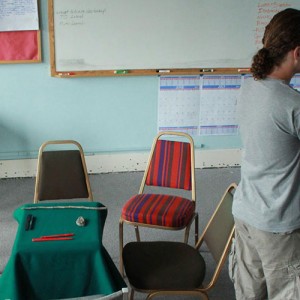22 minutes and 36 seconds.
Evan and Willem talk about the importance of returning, experienced WAYK players at workshops, while traveling to Vancouver, B.C., for the “Save Your Language” conference hosted by Dustin Rivers of Squamish Nation.
1. Technique “Please Return WAYK Players”
- Return players will help workshops and game experiences go faster.
- The more return players present in a particular workshop, the greater the acceleration.
- The more acceleration, the farther we can go in a workshop, the more new WAYK frontiers we can explore, earlier.
2. Technique “WAYK Proficiency Roadmap”
- Novice: Baby Bird. Feed me! Feed me! Fully wants to play, can wield one or two techniques.
- Intermediate: Language Hunter. Can run a lotus game.
- Advanced: Host. Can run a room full of tables, a language night. Using a 1-4 hour block of time as effectively as possible, with a full range of speech proficiencies present.
- Superior: Community Leader. Can mobilize a region by running day-long workshop experiences.
3. Technique “WAYK Workshop”
- The first level WAYK workshop gets people to Intermediate WAYK play.
4. Technique “Language Night”
- Just because you may not be proficient in a language-night level of WAYK play, you can still run a language night; just play at your level, even if it’s just a single pair of players.
- Part of fully running a language night means dealing skillfully with newbies who walk through the door – they don’t slow you down, because you have successfully delegated and trained other game leaders.
5. Technique “Teach a Teacher”
- Newbies need to run a WAYK game on their third language night. If you wait longer, newbies will become handicapped and have a much harder time getting started teaching.
- Newbies need to start teaching before they know enough about what they don’t know.
6. Technique “Último”
- Every newbie, on their third night, replaces the role of the newbie who taught them.
- Players are lined up like dominoes, each one advanced to larger roles as newbies come in the door, replacing them in the more fundamental roles.





[…] July 28, 2010 in Uncategorized | by Willem For August and September, we have three different WAYK events coming up. We are actively seeking experienced WAYK players to back us up at these events, as we spoke about in the “Please Return WAYK Players” podcast. […]